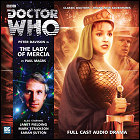 The Doctor lands the TARDIS near the University of Frodsham in 1983, just in time to attend a historical conference – and, perhaps, track down some indications of primitive time travel taking place here. By posing as “Dr. Jovanka” from Wollongong (and entourage), the Doctor gets to take part. Tegan experiences a strange sensation while looking at a prized sword said to have belonged to the 10th century warrior queen Æthelfrid, and later sees the college’s history professor stealing the sword. He takes it to a campus science lab where his wife has constructed a primitive time machine, which then propels Tegan and the professor back to the 10th century; their meeting with the real Æthelfrid doesn’t exactly go well, and the time travelers are accused of sorcery. Worse yet, the time machine reactivates, send Æthelfrid’s warrior princess daughter back to 1983. The Doctor promises to take Ælfwynn back to the 10th century in the TARDIS in exchange for her not killing anyone, but even that plan goes awry, landing them behind enemy lines. When Æthelfrid offers to spare the time travelers’ lives in exchange for Tegan assuming her daughter’s identity, it seems that history is almost destined never to be the same again.
The Doctor lands the TARDIS near the University of Frodsham in 1983, just in time to attend a historical conference – and, perhaps, track down some indications of primitive time travel taking place here. By posing as “Dr. Jovanka” from Wollongong (and entourage), the Doctor gets to take part. Tegan experiences a strange sensation while looking at a prized sword said to have belonged to the 10th century warrior queen Æthelfrid, and later sees the college’s history professor stealing the sword. He takes it to a campus science lab where his wife has constructed a primitive time machine, which then propels Tegan and the professor back to the 10th century; their meeting with the real Æthelfrid doesn’t exactly go well, and the time travelers are accused of sorcery. Worse yet, the time machine reactivates, send Æthelfrid’s warrior princess daughter back to 1983. The Doctor promises to take Ælfwynn back to the 10th century in the TARDIS in exchange for her not killing anyone, but even that plan goes awry, landing them behind enemy lines. When Æthelfrid offers to spare the time travelers’ lives in exchange for Tegan assuming her daughter’s identity, it seems that history is almost destined never to be the same again.
written by Paul Magrs
directed by Ken Bentley
music by Steve FoxonCast: Peter Davison (The Doctor), Janet Fielding (Tegan), Mark Strickson (Turlough), Sarah Sutton (Nyssa), Anthony Howell (Professor John Bleak), Abigail Thaw (Dr. Philippa Stone), Rachel Atkins (Queen Æthelfrid), Catherine Grose (Princess Ælfwynn), Kieran Bew (Arthur Kettleson), Stephen Critchlow (Earl of Wessex)
Timeline: for the Doctor, Tegan and Turlough: between Enlightenment and The King’s Demons; for Nyssa: 50 years after Terminus. This story takes place after Eldrad Must Die! and before Prisoners Of Fate.
LogBook entry and TheatEar review by Earl Green
Review: All the way back to The Aztecs, some of the Doctor’s companions just haven’t quite “gotten” one of the central conceits of Doctor Who – that you can’t just jump in an rewrite history on a whim. The big problem in The Lady Of Mercia is that poor Tegan has little choice in the matter. Paul Magrs’ script, focusing on historical figures from the dark ages before the foundation of anything resembling the British Empire, is carefully researched (well, strictly speaking, “Æthelfrid” should be more properly rendered as “Æthelflæd”), and Magrs has found a great little historical “dead end” in which to insert the time travelers.
It’s safe to say that this may well be Janet Fielding’s finest hour since rejoining the TARDIS team on an almost full-time basis over the past several years. Here we have a Tegan who, while she’s still forthright to a fault, has gotten the hang of time travel, clearly enjoys stepping into history as an experience more visceral than a “keep your hands inside the cart at all times” ride, and (thanks in no small part to her habit of becoming separated from the Doctor) is capable of taking a leadership role and making life-or-death decisions. The script takes great pains to point out that Professor Bleak survives the day only thanks to Tegan’s interference (for which the Doctor, not quite understanding the stakes, rakes her over the coals later). This is a Tegan matured and seasoned by what she has seen. It’s really easy to like this Tegan (and one gets a sense that Janet Fielding really liked playing this Tegan as well).
The Lady Of Mercia is one of the best products of Big Finish’s ongoing reunion of the season 20 cast – a ride that, sadly, ends with the following story.
